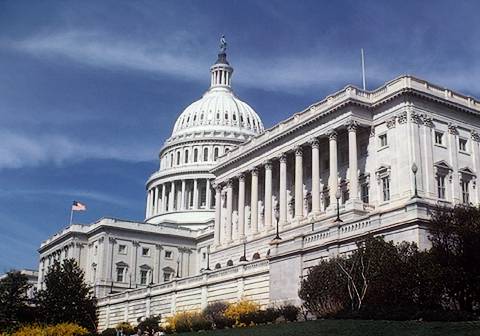WASHINGTON — The elephant in the room never actually made it into the room this morning. But Sen. Tom Cotton, R-Arkansas, who last year scuttled a juvenile justice reform bill over the objections of experts and the overwhelming majority of Congress, was clearly on everybody’s mind.
Four speakers and a half-dozen members of the Senate Judiciary Committee never mentioned Cotton by name as they forcefully criticized the practice of incarcerating juveniles for status offenses, actions that aren’t even a crime, such as smoking or skipping school against a valid court order, unless you’re a juvenile. Cotton single-handedly blocked the reform bill solely on that issue, saying judges should retain that option.
Lawmakers and the panel of experts spent 90 minutes pounding home a simple message: Passing juvenile justice reform is too important to let it slip away again, especially when all the data shows locking up kids for minor offenses is a terrible idea that increases crime.
“Those who broke laws that apply only to children, such as curfew violators and truants, face particularly great obstacles inside a detention facility,” said Sen. Chuck Grassley, R-Iowa, the judiciary committee chairman, in his opening remarks. “These young people not only will be separated from their families, but also may be confined with much older juvenile delinquents who committed rapes, robberies or murders. They are at greater risk of sexual assault than other juveniles, research suggests.”
The hearing covered a wide range of topics, sometimes veering toward the philosophical as lawmakers and panelists discussed not only the crime bill but looked at why some segments of the country still insist on practices that research shows are more expensive and less successful than treatment and family-oriented care.
“Clearly there is a lot of evidence of the harmful effects of incarcerating juveniles, yet we spend more money on that aspect than we do on alternative programs. Why does so much of our country always go for the incarceration model?” asked Sen. Mazie Hirono, D-Hawaii. “I mean this can be a whole philosophical discussion, but we need to turn that kind of thinking around, don’t we?”
Jake Horowitz, director of research and policy for the Pew Charitable Trusts, said a boom of new juvenile facilities about 15 years ago was in response to a rapid increase in crime at all age levels.
“Part of it is folks responding, in a very understandable way. We felt like we needed to act, and back then there wasn’t as much research,” Horowitz said. “It seemed like an easy thing to do. People know how to build buildings and put people there. But the evidence shows we didn’t get good outcomes and a lot of harm was done. These facilities gobble more and more of the public safety budget.”
Yasmin Vafa, executive director of Rights4Girls in Washington, D.C., said states that spend so much money on new youth detention facilities feel compelled to use them.
“We have found that when you open a facility, a very costly facility, inevitably children are going to be sent there, whether or not that is the most appropriate intervention necessary,” Vafa said, arguing that most juvenile detention facilities could be shuttered with no increase in crime. “But what is clear for the past 15 years that show these punitive process don’t actually work, and in many cases they increase recidivism.”
Vafa opened the hearing addressing the debilitating effects of prison on young girls, many of them whom have been sexually and physically abused. She said too many discussions on juvenile justice reform fail to address their issues, “when in fact girls are the fastest-growing segment of the juvenile justice population. Research demonstrates that sexual abuse is the primary predictor for girls’ involvement in the juvenile justice system.”
Vafa told the story of Melissa, a 14-year-old girl who was “sex trafficked in New York and sold to grown men for profit.”
“Instead of being seen or treated as a victim of trafficking, Melissa was arrested and charged with prostitution,” she said. “Another survivor of child sex trafficking explained that her time in detention wasn’t all too different ‘than the mental confinement I endured from my pimp. I was retraumatized every day in detention while having to be watched, fully nude, while I showered.’”
Stories such as those prompted every senator in attendance to lash out at the practice of juvenile detention when therapy is more humane and works better. Those feelings were particularly strong during the testimony of 17-year-old Jinique Blyden of Hollywood, Florida.
Blyden told her story of coming from St. Thomas to the United States as a young girl, being raised by a single mother and struggling for basic necessities. She went from being an honor roll student to a constant truant who ran away often. Eventually she wound up in school at the Pace Center for Girls.
“I got angry, and I lashed out. I ran away,’’ she said. “I got in trouble, and then I made a mistake and brought marijuana to school and smoked it. It could have ruined my life.”
Instead, Florida law enforcement only gave her a citation, Pace suspended her for 10 days and Blyden was given treatment instead of incarceration.
“You have more poise than a lot of the senators who speak here,” said Sen. Thom Tills, R-North Carolina. “You are a great example, and should be very proud of yourself. The evidence is clear that reforms work.”


























